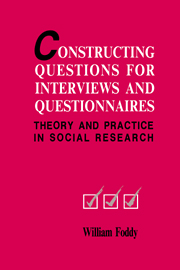Book contents
- Frontmatter
- Contents
- Tables
- Figures
- Preface
- Chapter 1 An initial statement of the problem
- Chapter 2 A theoretical framework
- Chapter 3 Defining topics properly
- Chapter 4 Formulating intelligible requests for information
- Chapter 5 Contextual influences on respondents' interpretations of questions
- Chapter 6 The need to provide response frameworks
- Chapter 7 The limitations of human memory
- Chapter 8 Filters: establishing the relevance of questions to respondents
- Chapter 9 Reducing question threat
- Chapter 10 The open vs. closed questions debate
- Chapter 11 Measuring attitudes
- Chapter 12 Checks to ensure that questions work as intended
- Chapter 13 Concluding comments
- The tap paradigm
- References
- Index
- Acknowledgements
Chapter 2 - A theoretical framework
Published online by Cambridge University Press: 04 September 2009
- Frontmatter
- Contents
- Tables
- Figures
- Preface
- Chapter 1 An initial statement of the problem
- Chapter 2 A theoretical framework
- Chapter 3 Defining topics properly
- Chapter 4 Formulating intelligible requests for information
- Chapter 5 Contextual influences on respondents' interpretations of questions
- Chapter 6 The need to provide response frameworks
- Chapter 7 The limitations of human memory
- Chapter 8 Filters: establishing the relevance of questions to respondents
- Chapter 9 Reducing question threat
- Chapter 10 The open vs. closed questions debate
- Chapter 11 Measuring attitudes
- Chapter 12 Checks to ensure that questions work as intended
- Chapter 13 Concluding comments
- The tap paradigm
- References
- Index
- Acknowledgements
Summary
In this chapter we address the need for a theoretical framework within which the methodological assumptions underlying the use of verbal data in social research can be discussed. A theoretical analysis of these assumptions is necessary because they inevitably influence the way we go about collecting data about the social worlds in which we are interested. If we want to improve our ability to formulate questions which work in the way we want them to work, we must understand the methodological implications of the assumptions underlying the procedures we use.
Leaving aside the reasons for the current state of affairs, for most of this century the social sciences have been characterised by two broad approaches to collecting verbal data. On one side we have had the increasingly dominant survey researchers who have tended to go about their work in a way that might be compared to the way physical scientists go about theirs. They have typically proceeded with the positivistic orientation that they are either discovering or describing an ‘objective’, ‘real’ world ‘out there’ and that their measures have ‘true’ values. To this end, they have typically employed a stimulus–response model which assumes that each question is understood in the same way by all respondents. Because the stimulus–response model implies both that each stimulus must be carefully standardised and that each respondent will only give one response to each stimulus, survey researchers have favoured the use of forced choice questions (otherwise referred to as closed questions).
- Type
- Chapter
- Information
- Constructing Questions for Interviews and QuestionnairesTheory and Practice in Social Research, pp. 12 - 24Publisher: Cambridge University PressPrint publication year: 1993



